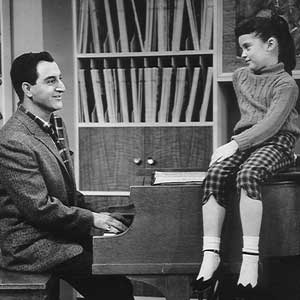Make room for Daddy

Danny Thomas may not have changed diapers in the popular ’50s/’60s sitcom “Make Room For Daddy,” but he did entertain the children.
The scene is repeated over and over in 1950s sitcoms.
A father comes home from work and is greeted at the front door by his wife.
She takes his briefcase and fixes him a drink. The father then resorts to his favorite recliner, briefly acknowledges his children, and reads the newspaper.
No diaper changes. No homework help. Nothing.
“This was how gender roles in the family were portrayed back then,” says Brenda Volling, a psychology professor at the University of Michigan. “But the stay-at-home mom with the breadwinner dad model just does not apply to the vast majority of families anymore.”
Volling heads up U-M’s Center for Human Growth and Development, an interdisciplinary research center that has fostered several new research projects highlighting the role of fathers and how their increased involvement impacts their families. And figures from the National Fatherhood Initiative seem to back her research (see breakout box).
“The common portrayal of TV fathers in the 1950s no longer applies to today’s society,” says Volling, who has studied fatherhood for nearly 30 years. “Fathers have taken on a much more substantial role over the years when it comes to caregiving. Much of what we know about parenting focuses solely on mothers, yet fathers are often the forgotten or silent contributors to children’s development.”
Magic moment
A man anxiously looks on as a sonographer applies a clear jelly to his girlfriend’s skin.
The sonographer then grabs a medical instrument and slowly guides it across the pregnant woman’s abdomen.
After a few seconds, the man turns toward a small monitor and catches the first glimpse of his unborn baby.
“It was one of the most amazing things, if not the most amazing thing I’ve ever seen in my life … the baby’s foot, the baby’s hand, the baby’s heart, the baby’s face,” he says. “Finding out that it’s going to be a girl … it’s a lot of thoughts and emotions to go through in a 15-minute timespan.”
Rich Tolman and his colleagues Dr. Vijay Singh and Toya Walsh interviewed 22 men after they sat through a prenatal ultrasound to determine whether the appointment motivated them to change their behavior.
“The ultrasound sort of serves as a wakeup call for a lot of guys,” says Tolman, a social work professor at U-M whose research focuses on fatherhood and intimate partner violence. “One of the things we often hear from men is that they live their lives according to their own needs. After the ultrasound, they start to think about the sacrifices they must make to be a good dad.”
One of those sacrifices includes employment.
“I need to make sure I have a steady job because my child eating depends on me,” a man told the research team soon after he learned he would have a son. “If I don’t work, he don’t eat. And I’d rather my child eat before I do … I’m gonna do whatever it takes right now, no matter what it takes, to make sure that when it comes to that time, money’s saved up so they can go to school even if they can’t get a scholarship.”
Sixty years ago, Tolman would have struggled with this particular research topic. In the 1950s, fathers hardly played an active role during pregnancy. Today, studies show that about 90 percent of fathers attend ultrasounds.
“An ultrasound is sort of that first magic moment for a lot of men, so we should use this opportunity to engage men, ask them what they need, and arrange for them to get those resources,” Tolman says. “For years, there weren’t always a lot of resources available for expectant fathers. But that’s changed over the years and it really highlights the increased involvement between fathers and their children.”
The adjustment period
The changes are evident for women during pregnancy.
Her skinny jeans no longer seem to fit like they did before.
Her meal plan is cast aside as she begins to crave unique treats at all hours of the night.
And her routine climb up a few flights of stairs now leaves her gasping for air.
Men undergo more subtle transitions, and past research has shown that most changes occur after birth.
But new research at U-M reveals that men experience hormonal changes even before they become fathers.
“These changes could be a function of psychological changes that men experience as they prepare to become fathers, changes in their romantic relationships or even physical changes that men experience along with their pregnant partners,” says Robin Edelstein, an associate professor of psychology at U-M. “Nevertheless, fathers’ hormonal changes could have important implications for paternal behavior once their babies are born.”
Edelstein and her colleagues at U-M examined saliva samples from 29 couples that were expecting their first child. Researchers tested for four prenatal hormones, including testosterone, at various times throughout the pregnancy to measure any possible changes.
Women showed large prenatal increases in all four hormones, which coincides with previous research on expectant mothers. Men, however, began to experience a dip in testosterone months before they entered the delivery room.
This marks the first study to demonstrate prenatal testosterone changes in expectant fathers, which could have a major impact on child development.
“Men who showed larger declines in testosterone reported less hostile behavior with their infant, and their partners reported that they helped around the house more often,” Edelstein says. “People often associate testosterone with aggression, so if men are showing lower levels of this hormone after their child is born, the thought is that they might be better equipped to cope with their new responsibilities as a parent.”
A major step
For Volling, the academic conferences all begin in a similar fashion.
The keynote address and breakout sessions focus on child development, but the conversation often tends to mention only one caregiver — mom.
What about dad?
“For so long, the study of child development has focused on the study of mothers and children,” Volling says. “The field of child development needs to change in some sense to reflect what’s really going on out there in the real world. More often we see fathers choosing to take an active role in raising their children, and that has a major impact on child development.”That’s what inspired Volling and Natasha Cabrera from the University of Maryland to convene a working group of national and international scholars who focus on fatherhood research and its impact on child development. Their idea caught the attention of the Society for Research in Child Development, which will fund a two-day conference in Ann Arbor next spring for fatherhood researchers.
Scholars from across the globe will visit U-M to discuss ways in which researchers can help close the gap between fathers and their influence on child development.
“This is a major step in addressing the importance of fatherhood research in today’s society,” Volling says. “And what better place to host a conference like this than Ann Arbor? Here at the Center for Human Growth and Development, our goal is to change how we think about parenting by examining the important role of father-child relationships. Our hope is that this understanding will eventually improve services and interventions that support fathers and the healthy development of their children.”
This story originally appeared in the June 2015 issue of Michigan Research.





Rena Harold - 1986
An interesting piece, but you should look back in UM history, and consider the innovative work from the 70’s and 80’s on father caregiving by Dr. Norma Radin, Professor Emerita in the School of Social Work (now deceased).
Reply